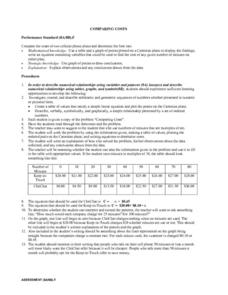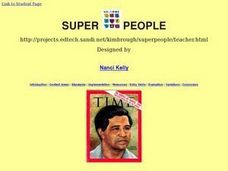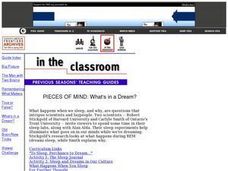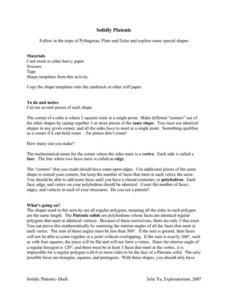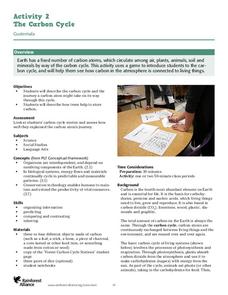Curated OER
The Reasons for the Seasons
Sixth graders conduct a controlled investigation to determine the length of the sun's shadow on a fixed object (i.e., flagpole, telephone pole, etc.) over a three-day period (one day in the fall, one in the winter, and one in the...
Curated OER
Louisiana and Canada: Understanding Acadian Cultural connections
Ninth graders investigate why Acadians moved to Lousiana. In this geography lesson, 9th graders research the migration of Acadian to Louisiana and how that influenced the culture. Students analyze a list of cultural and physical...
Curated OER
Juggling (Day 1)
Students demonstrate the juggling code, and 2 and 3scarf/ball juggling, utilizing the scoop underhand throw, Accurate Toss Zone and criss-cross pattern. They participate in an initiative task called group juggling, attempting to pass as...
Curated OER
Comparing Costs
Students compare the costs of two cellular phone plans and determine the best rate. They use a table and a graph of points plotted on a Cartesian plane to display their findings. Students write an equation containing variables that could...
Curated OER
On The Farm
Young scholars study a dairy farm and also the crops that grow on farms. They research how we depend on farms to get the food we eat. They transform their findings and describe one the farms or make up their own. They turn the...
Curated OER
SUPER PEOPLE
Second graders study the talents and interests that have helped people to "make the world better." They begin by reading a story about 5 individuals who have "made a difference." This webquest extends this exploration by guiding the...
Curated OER
Pieces of Mind: What's In A Dream?
Students explore the five stages of sleep. They view video footage of sleep labs and discuss the findings. Students conduct experiments by keeping a sleep journal to track their sleep and dream activity. They find examples of ways...
Curated OER
Magnetism
In this magnetism worksheet, students answer ten questions about magnets, their magnetic poles, the magnetic lines of flux and how magnets work.
Curated OER
Strike a Pose: Modeling in the Real World (There's Nothing to It!)
Adjust this lesson to fit either beginning or more advanced learners. Build a scatter plot, determine appropriate model (linear, quadratic, exponential), and then extend to evaluate the model with residuals. This problem uses real-world...
Curated OER
The Monarch Butterfly Watch
Learners explore monarch migration through the Journey North web site. In this butterfly instructional activity, students use the internet to identify a butterfly's migration pattern. Learners write in electronic journals.
Curated OER
Elephant Earth Adventures . . .
In this reading comprehension about African elephants worksheet, students read factual passages about their physical characteristics, amazing facts, tusk uses, ears, trunk, skin, movement, food needs, extended families, and the active...
Curated OER
Food Pyramid Power: Looking Back and Moving Forward
Students show their knowledge of properties of objects as it pertains to sorting and creating patterns. In this food pyramid power lesson plan, students show their ability to use whole numbers in different representations by appling...
Curated OER
"A Pig is Big"
Students explore the concept of big, bigger, and biggest. They examine and classify items by size, listen to and discuss the book "A Pig is Big," complete a fill in the blank activity, and create a tri-fold that illustrates two items...
Curated OER
Beetle Wheels
Second graders link the development of skip-counting patterns to bars on a relationship graph. They also plot our skip-counting patterns on a hundred's board, counting by 2's and also by 4's.
Curated OER
TLC--Lesson Plans
Students in the grades kindergarten and 2nd grade interact with each other. They (2nd graders) faciliate one on one tutoring in the areas of reading and writing with the kindergartens. Students in the 2nd grade promote mentoring skills.
Curated OER
Solidly Platonic
When they do, they learn. Using this resource, young mathematicians learn about platonic solids by actually building, touching, and examining the shapes. They connect their observations about the shapes to Euler's formula.
National Security Agency
Multiple Representations of Limits
After an introductory activity to demonstrate the theory of a limit, additional activities approach a limit from graphical, numerical, and algebraic methods. The activity looks at the multiple ways of understanding and evaluating a limit.
Center for Technology in Teaching and Learning
CSI: The Experience - Family Forensics
Forensic scientists depend on their observation skills to analyze evidence down to the molecular level. Middle and high schoolers practice making observations and predictions with a series of crime scene activities, which includes a...
Rainforest Alliance
The Carbon Cycle
Scholars learn about the carbon cycle, play a carbon cycle game, and then write a story based on their role as a carbon atom during the game. After the writings, pupils analyze the carbon cycle by leading a class discussion on the material.
Curated OER
Activity: Gummy Bear Genetics
Who's your Daddy ... and Mommy for that matter? Given a first-generation group of gummy bear offspring, young scientists must determine which bears are their parents. An activity worksheet covers the differences in genotypes and...
Association of American Geographers
Project GeoSTART
Investigate the fascinating, yet terrifying phenomenon of hurricanes from the safety of your classroom using this earth science unit. Focusing on developing young scientists' spacial thinking skills, these lessons engage learners in...
Illustrative Mathematics
Regular Tessellations of the Plane
Bringing together the young artists and the young organizers in your class, this lesson takes that popular topic of tessellations and gives it algebraic roots. After covering a few basic properties and definitions, learners attack the...
Hood River County School District
Text Structure: Features and Organization
Teach learners how to interact with both fiction and non-fiction text with a packet of activities and worksheets. After looking over text structure and the difference in text features between different types of writing, readers analyze...






